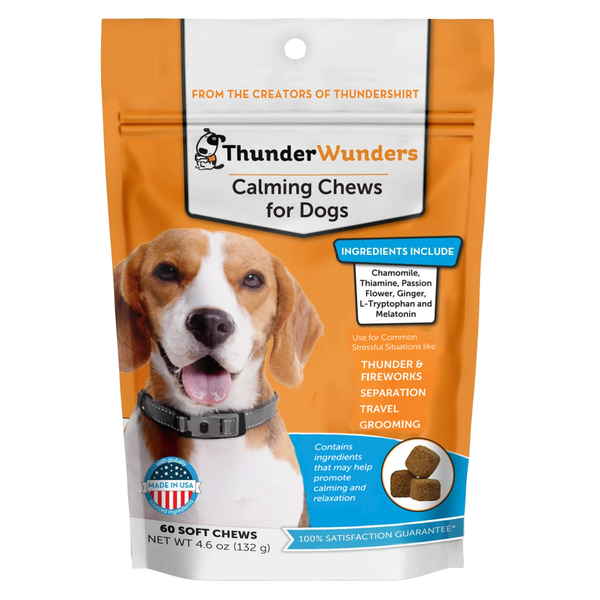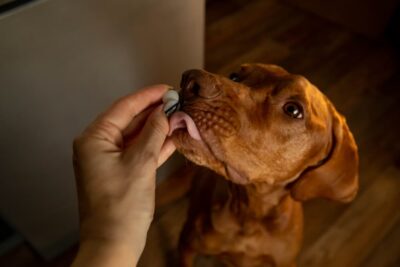Dog Anxiety Medication: 12 Prescription and OTC Options

All featured products are chosen at the discretion of the GreatPetCare editorial team and do not reflect a direct endorsement by the author or reviewer.
Mental health has become normalized in human health. But our pets’ mental health deserves attention too. Like people, dogs can suffer from anxiety. If not managed well, this anxiety can harm a dog’s emotional well-being and physical health. Anxiety cannot be cured. But it can be managed with over-the-counter (OTC) products, prescription dog anxiety medication, and behavioral modification.
Let’s take a closer look at why anxiety relief for dogs is so important. Plus, we’ll explore some OTC and prescription dog anxiety medication options to consider.
Anxiety Relief for Dogs: Why It’s Important
We all feel anxious occasionally, and our dogs are no different. A stressful situation or environment usually triggers that anxious feeling. Anxiety becomes a problem in our dogs when it is not well controlled and goes unchecked.
The most common root causes of anxiety in dogs include situational, separation, and aging.
Situational anxiety is often short-lived. It’s usually triggered by noise phobias, strange or unfamiliar environments, and unfamiliar animals.
Dogs with separation anxiety become anxious and can’t calm themselves down when separated from family. Symptoms of separation anxiety include destroying things and having accidents in the home.
Senior dogs can become anxious and confused when they begin to lose their memory and awareness, signaling the onset of canine cognitive dysfunction. Canine cognitive dysfunction resembles human dementia.
Other situations, such as pain and unfamiliar scents, can also trigger anxiety in dogs.
Anxiety symptoms may be obvious or subtle and vary in their intensity and frequency:
Obvious symptoms
- Pacing
- Panting
- Drooling
- Avoidance
- Trembling
- Aggression
- Restlessness
- Appetite loss
- Destructive behavior
- Bathroom accidents
- Whining and crying
Subtle symptoms
- Yawning
- Licking the lips
- Ears pulled back
Left unchecked, anxiety in dogs can cause behavioral problems like aggression and self-injury. Chronic, generalized anxiety can take a toll on a dog’s physical health, too. It’s linked to an increased risk of allergies and digestive problems like inflammatory bowel disease.
If you think your dog is anxious, take them to your vet and provide a detailed history of your dog’s anxiety. They can help you identify the trigger(s) and develop an individualized treatment plan, which may include dog anxiety medication.
What Can I Give My Dog for Anxiety?

Managing anxiety in dogs takes a multi-modal approach with anxiety medication for dogs and behavioral modification. Even with many treatment options available, remember there are no quick fixes. Also, there is no ‘one size fits all’ management approach, and treatment may need to be tweaked over time.
You do not need a veterinary prescription for an OTC anxiety medicine for dogs. For example, aromatherapy with calming scents (e.g., lavender) and pheromone collars and diffusers can reduce dog anxiety and are available over the counter. Pheromones are natural body chemicals that our pets release into the environment.
Other non-prescription anti-anxiety meds for dogs are formulated as chews, tablets, and drops. CBD has grown in popularity for reducing anxiety, especially in people. CBD chews are available for dogs, but research on CBD’s use and safety in dogs is still relatively new and ongoing.
Prescription anxiety meds for dogs are used for cases of severe anxiety but can also be used to relieve short-term anxiety, such as before a thunderstorm or fireworks. These are typically human medications that are used ‘off label’ (not the FDA-approved indication) in dogs.
Always consult your veterinarian before starting your dog on canine calming medications or products.
5 Supplements and OTC Anxiety Meds for Dogs
Several OTC products and anxiety supplements for dogs are available to manage anxiety. Here are some options to consider:
Solliquin

Solliquin is a daily chewable tablet containing two plant extracts — magnolia and phellodendron — to help calm anxious dogs. It also contains L-theanine, an amino acid that is safe for dogs and has been shown to relieve dog anxiety.
Purina Pro Plan Calming Care Supplement

This powdered supplement is sprinkled onto food and given daily according to veterinarian instructions. It contains probiotics, which are good gut bacteria. The probiotic strain in this supplement, BL999, has been shown to reduce anxious behavior and help dogs maintain calm behavior in stressful situations.
VetriScience Composure Bite Size Chews for Dogs

These calming chews are intended for dogs whose anxiety is triggered by environmental stressors, such as moving or a veterinary visit. It contains three calming ingredients for dogs: L-theanine, thiamine (vitamin B1), and a proprietary protein mix. These chews can be given as needed or daily.
Rescue Remedy drops

Rescue Remedy drops are a popular choice for reducing anxiety in dogs. The drops, which contain a blend of floral extracts, can be given when a dog is in pressure- or anxiety-inducing environments, like loud noises or after a sudden fright. They can be added to food or water and repeated as needed to calm your dog in stressful situations.
ThunderWunders Calming Chews for Dogs

These calming chews are recommended to relieve dog anxiety triggered by thunder and fireworks, travel, vet and groomer visits, and separation anxiety. They contain ginger to settle anxiety-induced stomach upset, along with L-theanine and L-tryptophan (an amino acid) to reduce anxiety. Other ingredients include a flower extract and melatonin.
These chews can be given to dogs 12 weeks and older and should be given during or after a meal to prevent stomach upset.
Dog Anxiety Medication: 7 Prescription Options
Prescription anti-anxiety medications for dogs may be given long-term or short-term for anxiety relief, depending on a dog’s type and severity of anxiety. Dog anxiety medication changes the levels of neurotransmitters (brain chemicals) that play a role in anxiety.
These prescription dog anxiety meds may interact with other medications and often have side effects that can be uncomfortable but are generally tolerable. Review your dog’s current medication list with your veterinarian before starting a dog anxiety medication.
Clomicalm

Clomicalm (generic name: clomipramine) comes in tablet form and treats separation anxiety in dogs. It is a tricyclic antidepressant, a class of drugs that is commonly used to treat depression with anxiety and other mental health conditions in people.
When used with behavioral modification, Clomicalm helps reduce separation anxiety-related behaviors, including inappropriate elimination and destructive behavior. This calming medication for dogs is given with food and may cause side effects such as vomiting, lethargy, and diarrhea.
Reconcile

Reconcile (generic name: fluoxetine) is a chewable tablet. It is a selective serotonin reuptake inhibitor (SSRI), a drug class that blocks the reuptake of serotonin, a neurotransmitter that helps manage anxiety. Increased serotonin levels in the brain help reduce anxiety.
Reconcile treats separation anxiety and is given once daily. Potential side effects of this anti anxiety medicine for dogs include appetite loss, stomach upset, and depression.
Alprazolam
Alprazolam (brand name: Xanax) is a short-acting anti-anxiety medication. It is available as a tablet or liquid and should be given about 30 to 60 minutes before an anxiety-inducing event, such as fireworks.
Alprazolam can be given on an empty stomach but also with food to reduce stomach upset. Potential side effects include lethargy, increased appetite, and incoordination.
Buspirone
Buspirone (brand name: BuSpar) is another short-acting anti-anxiety medication. It comes in tablet form and, like alprazolam, can be given with or without food.
Buspirone’s effects usually take several weeks to become apparent. Side effects of this dog anxiety medication include sleepiness, decreased appetite, and stomach upset.
Diazepam
Diazepam (brand name: Valium) has many uses, one of which is reducing anxiety in dogs. It comes in liquid or tablet form and is given with or without food.
Diazepam is short-acting and should be given about 1 hour before an anxiety-triggering event. It will take effect in about 1 to 2 hours. Side effects include incoordination, drooling, and increased appetite.
Trazodone
Trazodone (brand name: Desyrel) is an SSRI that treats separation anxiety in dogs and anxiety triggered by situations like fireworks, vet visits, and travel. It is a tablet that can be given with or without food, depending on how well your dog’s stomach tolerates it.
Trazodone can be given for short-term anxiety (1 to 2 hours) or long-term anxiety treatment. Side effects of this dog anxiety medication are generally mild and include lethargy, vomiting, and increased appetite.
Sileo

Sileo (generic name: dexmedetomidine) is an FDA-approved gel that treats noise aversion in dogs. It is the first product of its kind. Sileo produces a calming effect without causing sedation, helping dogs stay alert as their anxiety levels decrease.
The gel is administered in a dog’s cheek pouch about 30 to 60 minutes before an anxiety-inducing event. Additional doses can be given (up to five) at least two hours apart. After administration, a dog should not be fed for at least 15 minutes to ensure absorption.
Potential side effects of this anxiety med for dogs include pale gums and a drop in blood pressure.
How to Help Dog Anxiety: Other Tips and Advice
Managing your dog’s anxiety is a process. Work with your veterinarian to gauge your dog’s progress and adjust treatment as needed.
Medication for dogs with anxiety usually coincides with behavioral modification. Behavioral modification strategies include counterconditioning and desensitization. Your veterinarian may refer you to a veterinary behaviorist, who will assess your dog’s anxiety and develop a customized treatment plan. For example, your dog may benefit from specific separation anxiety training if that is the root cause.
Several home strategies can also help reduce your dog’s anxiety. These include establishing a routine and creating a safe space for your dog.
Be patient with your dog (and yourself) as you learn to manage your dog’s anxiety. In time, your dog’s anxiety will lessen, helping you and your dog breathe a welcome sigh of relief.
Frequently Asked Questions (FAQs)
Does my dog need anxiety medication?
Not every anxious dog needs medication, but for some, calming meds for dogs can be a helpful part of a broader treatment plan. If your dog’s anxiety is frequent, intense, or interferes with daily life, talk to your veterinarian about whether dog anxiety medicine might help.
Can dogs take Xanax?
Yes, dogs can take Xanax (alprazolam) in certain cases, but only under veterinary supervision. It’s sometimes prescribed for severe anxiety or panic, but the dosage and safety must be carefully managed.
Why is my dog so anxious?
Dogs can feel anxious for many reasons, including past trauma, lack of socialization, changes in their routine, or being left alone. Some breeds are also more prone to anxiety than others.
How can I tell if my dog has separation anxiety?
Signs of separation anxiety include destructive behavior, excessive barking, pacing, or house soiling when left alone. If these behaviors happen only when you’re away, separation anxiety could be the cause. Still not sure? Try our interactive quiz: Does my dog have separation anxiety?









